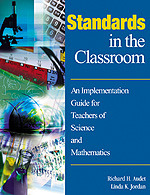Standards in the Classroom
An Implementation Guide for Teachers of Science and Mathematics
- Richard H. Audet - Roger Williams University
- Linda K. Jordan - Tennessee Department of Education
"The 'standards movement' offers great promise for strengthening American education; however, its success will depend upon how the standards affect classroom practice. Standards in the Classroom provides an excellent set of strategies to assist teachers in this critical task. Audet and Jordan have written a clear guide for making standards work in science and math education."
Larry Wakeford, Clinical Professor of Biology/Science Education
Brown University
"Studying Audet and Jordan's book before I developed my biology and chemistry curricula allowed a more thorough understanding of state adopted standards and how I can help all students meet them."
Dale Rudolph, High School Biology and Chemistry Teacher
Clarksville High School, TN
"In my work with teachers and teaching fellows, I have found no better method for enhancing understanding of the importance of standards and their implementation into content lessons than this book."
Vicki Metzgar, Coordinator, NSF Grade K-12 Teaching Fellows
Vanderbilt University Medical Center
Discover how to effectively integrate standards-based reform into the curriculum!
Standards have been executed at the national, state, district, and school levels. Teachers, however, have not received the support needed to effectively implement them into their classrooms. Now, professional educators and authors Richard H. Audet and Linda K. Jordan have designed a much-needed, unique guide that gives educators the tools for understanding today's standards and aligning them with their curriculum and instruction. While primarily targeting math and science, this book allows teachers to adapt its contents to any subject while proceeding at their own timetable and pace. Clearly written, practical, and easy to use, the book provides the missing link in standards-based reform. Comprehensive in its coverage of topics related to standards, the book is a valuable resource for both preservice and practicing teachers.
A full range of issues and topics are presented in this guide, including:
- Understanding the principles of teacher change, and teaching and learning in a constructivist environment
- Using national standards resources to better understand state and local standards
- Developing performance assessments linked to standards and using them to direct the selection of curriculum materials
- Mapping a curriculum by using principles in the guide
- Understanding the standards-based reform movement
Standards in the Classroom is organized around a five-stage learning cycle that models good teaching instruction. It applies an interactive approach that incorporates follow-up reflections, questionnaires, surveys, inventories, and rubrics to help users monitor their progress towards mastery of key concepts and applications. This guide is an absolute must for teachers, administrators, and professors to provide the support needed to effectively implement standards in the classroom.
The standards movement offers great promise for strengthening American education; however, its success will depend upon how the standards affect classroom practice. Standards in the Classroom provides an excellent set of strategies to assist teachers in this critical task. Audet and Jordan have written a clear guide for making standards work in science and math education.
Studying Audet and Jordan's book before I developed my biology and chemistry curricula allowed a more thorough understanding of state adopted standards and how I can help all students meet them.
In my work with teachers and teaching fellows, I have found no better method for enhancing understanding of the importance of standards and their implementation into content lessons than this book.
The success or failure of reform in education depends on how well each teacher learns how to implement standards in classroom instruction . . . This guide should be helpful in that process.
